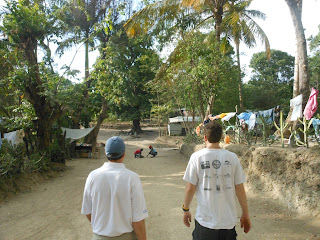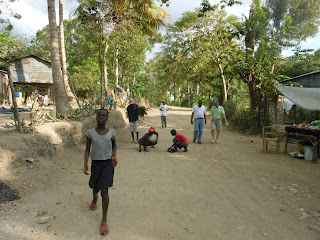In the first post of this Haiti trip series, I wrote about seeing the people who cooked our meals eating the food we had left on our plates. That was a difficult story to tell. But this one, today's story, is the toughest. Because it happened in front of us but I'm not sure many of us noticed.
It was right there. I saw it.
I should have done something.
But I did nothing.
I walked past, took photos, and wept.
But that's not the same thing as doing something.
In truth, there isn't much I could have done,
but still I am convinced and convicted that I should have done something.
Do you see them, the main protagonists in this story?
They are in front of Thold and Wes, squatting down on the road.
There they are behind us now, still squatting.
Eddie and Morris are about to walk past them.
What are they doing? They are picking up corn kernels. Down in the dust on the road were dry corn kernels that had fallen out of a bag. A black quart-sized bag at the young man's feet had apparently developed a hole and the corn had spilled out into the dirt.
As I walked past, I saw the corn. I saw their diligent and deliberate work in retrieving it. I kept walking.
I wanted to stop, but I didn't want to make them feel bad. I didn't want them to feel ashamed. Feel bad about what exactly? Ashamed about what? About the fact that they couldn't afford to leave any of their food on the road, in the dust? About the fact that they have so little that every kernel counts, every single kernel?
Perhaps I walked past and did nothing because I felt bad, because I felt ashamed. How is it that I didn't know there was such desperate hunger and need so close to home? How is it that I am so proud, so hurried, and so insensitive that it was more important for me to keep walking with my friends than it was to share that moment with those two people?
Yesterday someone asked me if the people of Haiti, of Bayonnais seemed happy. Oh, yes, they seemed to be very happy. They seemed to love one another and befriend one another in powerful and meaningful ways. As I wrote yesterday, they held one another's hands; they braided one another's hair; they played together; they smiled at, laughed with, and cared for one another almost without ceasing. And they did all of the above for us as well - one pre-adolescent boy, who happens to be blind in one eye, braids better than most women I know.
They spoke with dignity and strength, courage and determination - even as they told us of graduating from high school at 26 years of age, of failed crops, and last year's cholera epidemic. They didn't deny or downplay the deaths of their siblings, the floods that have destroyed their property, or the polygamous lifestyles that their fathers live. The people of Bayonnais are a remarkable people.
Squatting down in the road to pick up spilled food was nothing to be ashamed of. There were no tears in their eyes. There was no shame, no denial, and no plea for a handout from the Americans strutting past, mostly unaware of what was happening. I'm the only one who cried when I saw it.
So why is this the toughest story of all?
I'm still working on an answer to that one.


No comments:
Post a Comment